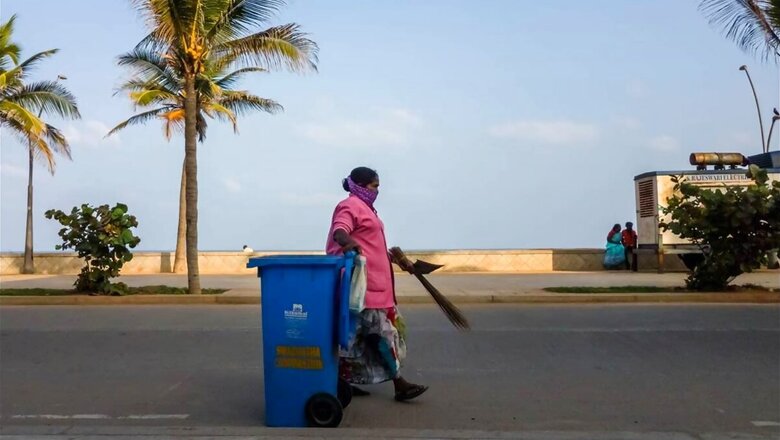
views
Till just a decade ago, it was easy to see why Indian children succumbed to diarrhoeal disease in large numbers, why women suffered from painful debilitating infections and why outbreaks of water borne and vector borne diseases could ravage communities at speed.
One only needed to look at our toilets (or lack of them). In what is considered the largest sanitation program in the world, the Swachh Bharat Mission changed all that. Today, after the construction of millions of toilets and nearly as many water connections, each Indian has access to a toilet.
But do they know how to use it? And more importantly, do they know how to keep it clean? According to a report by the Sub-Group of Chief Ministers on Swachh Bharat Abhiyaan, not yet. As Indians we still have some pretty strange ideas about toilet cleaning, and whose responsibility it is. This is a fact that India’s leading lavatory care brand, Harpic, is well aware of. Over the years, Harpic has led several campaigns that address toilet hygiene and the various small steps that families can take to ensure that their family toilets are safe.
Harpic, together with News18, created the Mission Swachhta aur Paani initiative 3 years ago. It is a movement that upholds the cause of inclusive sanitation where everyone has access to clean toilets. Mission Swachhta aur Paani advocates equality for all genders, abilities, castes and classes and strongly believes that clean toilets are a shared responsibility.
On the occasion of World Health Day, Mission Swachhta aur Paani led a spirited discussion amongst policy makers, activists, actors, celebrities and thought leaders with a panel from News18 and Reckitt’s leadership on the many ways in which poor toilet hygiene and sub-standard sanitation affects us all.
If we want to change minds, children can be strong agents of change
As a part of the Swachhta ki Paathshaala initiative, well known actor and celebrity mom Shilpa Shetty visited the Primary School Naruar in Varanasi, to talk to children about good toilet habits, hygiene and its link to good health. The children, whose school was the recipient of the Swachh Vidyalaya prize, dazzled both Shilpa Shetty and News18’s Marya Shakil with their detailed grasp of how toilet hygiene and maintenance directly impacts health outcomes and productivity.
One child also shared a heartwarming anecdote where he recounted to Marya that after the school program was implemented, he talked his family into building their own toilet. Of course, he is not the only one. As a part of the Mission Swachhta aur Paani, the teams from Harpic and News18 have come across several such stories that show us that mindsets are changing.
Toilets are changing the way women participate in society
For women in particular, access to toilets can translate into life changing consequences. Girl children have, in the past, had to drop out from schools because going to school involved ‘holding it’ the whole school day – there were no toilets. Or if the toilets existed, they weren’t in usable condition. At workplaces too, especially in the unorganised sectors, this lack of toilets often created productivity problems and posed another hurdle to more participation by women in the workforce.
Today, most of these problems are a thing of the past. Toilets in schools, colleges and workplaces are mandated, and the Swachh Bharat Mission ensures that every one of us has access to a toilet where we live. Communicators like Dr Surabhi Singh, who works with young girls to show them how easy menstrual hygiene can be, are helping with not just the problem of absenteeism, but also of dropouts. As girls miss less days of school, they perform better.
Sanitation workers are breaking cycles of intergenerational poverty
Attitudes towards sanitation workers are finally changing, albeit slowly. PM Narendra Modi sent a strong message to the nation when he bathed the feet of five sanitation workers in 2019. Harpic, too, has made significant strides in creating dignity for sanitation workers via the creation of World Toilet Colleges.
Padma Shri Usha Chaumar (Former sanitation worker, now President of Sulabh International Social Service Organisation), has witnessed this shift in attitudes firsthand: from being ostracised against, to being recognised as a Swachhta hero who is a regular on panels and discussions on the larger sanitation issues, and policy discussions. Shri Usha’s life has spanned both sides of this spectrum.
Beyond dignity to the sanitation workers themselves, the World Toilet Colleges are also helping uplift the families of sanitation workers too. In Patiala, a World Toilet College provided admission to 100 children of sanitation workers in public and private schools, breaking down barriers to education for the children of a community that was once considered untouchable. By educating these children, the cycle of poverty that has trapped their families for generations can finally be broken. Many of these children are the first in their families to get an education.
Diarrhoeal deaths could soon be a thing of the past:
Diarrhoea, which is often caused by poor toilet hygiene, is a leading cause of death among children under five, killing an estimated 300,000 children in India each year. The sad truth is that diarrhoeal deaths are entirely preventable. What was needed was a grassroots program that helped educate mothers about the link between toilet hygiene and diarrhoea. They also needed to be educated about adequate hydration and other critical steps that keep diarrhoea from escalating into a life threatening condition in young children.
Enter: Reckitt’s Diarrhoea Net Zero Program (DNZ), which is a life-saving initiative launched in collaboration with the government of Uttar Pradesh, Shri Brijesh Pathak, and Shri Anandiben Patel. Its primary aim is to save 100,000 children’s lives by addressing under-five diarrhoea management in India.
What makes the DNZ program unique is the role the Swachhta Prahari women play. These women go door to door, educating mothers on the importance of sanitation and hygiene, as well as provide guidance on how to keep toilets clean, keep homes and surroundings clean, and the proper way to wash hands with soap. These simple measures can go a long way in preventing the spread of diarrhoea and other diseases.
Prevention and cure: India’s holistic way of looking at solutions.
Union Health Minister Mansukh Mandaviya spoke about health in truly holistic terms, “When you speak of health, your home, your surroundings, the water you consume, the food you eat: all must be hygienic and your body must be healthy enough to fight off infections.” Prevention is a form of good health!
The GoI seeks to address all sides of this problem: The Swachh Bharat Mission was just one arm of this multi-pronged strategy. According to Shri Mansukh Mandaviya, the GoI is also taking a long-term view on increasing access to medical facilities by doubling the number of MBBS seats, as well as doubling the number of hospitals. Additionally, 156,000 wellness centres have been opened. These centres provide preventive care and screening both, and are equipped to consult with experts through telemedicine, bringing city-like expertise to the rural poor.
Watch the event here, to learn more about how you can partner in the national mission to achieve a Swasth Bharat through a Swachh Bharat.
Read all the Latest News here




















Comments
0 comment